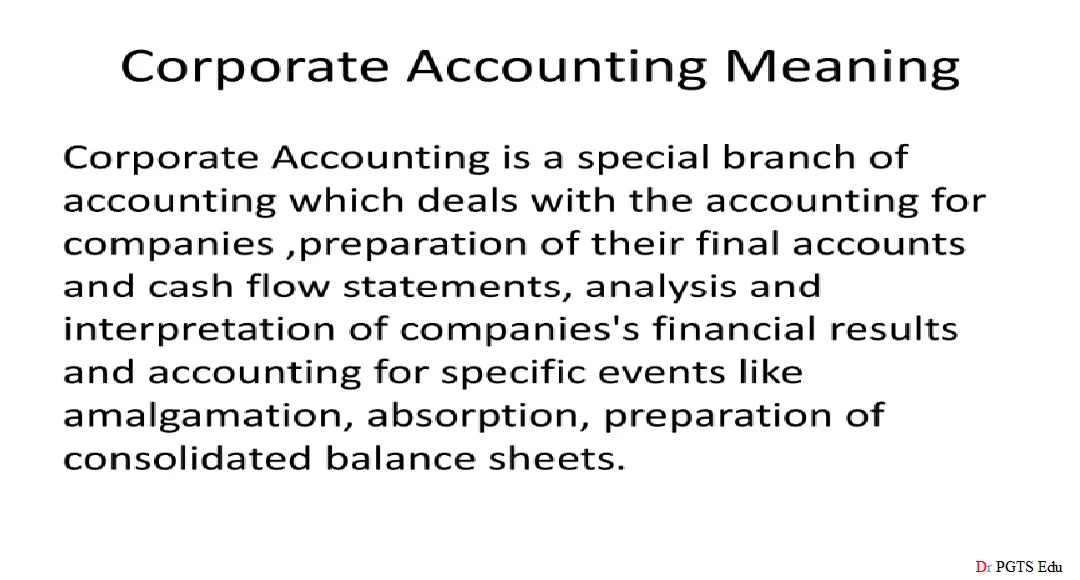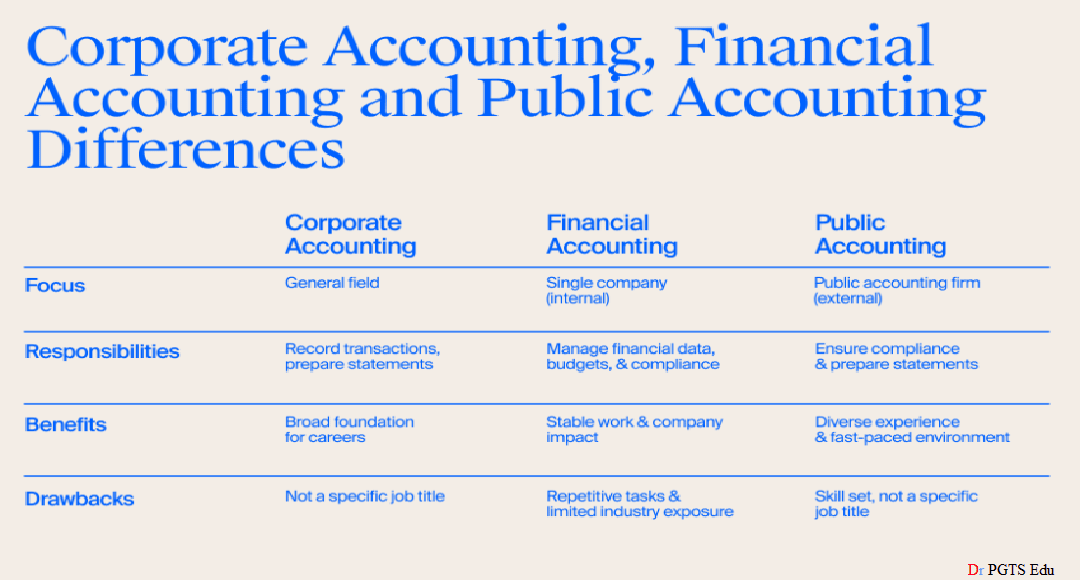Corporate accounting plays a crucial role in managing the financial activities of businesses. It ensures transparency, regulatory compliance, and accurate financial reporting. With evolving accounting standards and corporate regulations, staying ahead in corporate accounting is essential for businesses and professionals alike.
Corporate Accounting Features
Corporate accounting involves several key features that distinguish it from other types of accounting:
- Financial Statement Preparation: Ensures accurate profit and loss statements, balance sheets, and cash flow reports.
- Compliance with Regulations: Adheres to corporate laws and accounting standards.
- Management of Share Capital: Tracks issued shares, dividends, and equity transactions.
- Amalgamation and Mergers: Records financial impacts of corporate restructuring.
- Tax Planning and Compliance: Helps businesses meet tax obligations efficiently.
- Auditing and Internal Control: Implements financial checks and balances to prevent fraud.
Functions of Corporate Accounting
Corporate accounting serves multiple functions in a business:
- Recording Financial Transactions: Maintains systematic financial records.
- Budgeting and Forecasting: Helps businesses plan their financial future.
- Taxation and Compliance: Ensures adherence to tax laws and regulations.
- Financial Reporting: Prepares accurate reports for stakeholders.
- Analyzing Business Performance: Evaluates profitability and financial health.
- Managing Mergers and Acquisitions: Assists in the financial integration of businesses.
Types of Companies
Corporate accounting applies to various types of companies, including:
- Private Limited Companies (Pvt Ltd): Privately held businesses with limited liability.
- Public Limited Companies (Ltd): Companies with shares available to the public.
- Sole Proprietorships: Small businesses owned by individuals.
- Partnership Firms: Businesses operated by two or more partners.
- Limited Liability Partnerships (LLP): A hybrid of partnership and corporate structures.
Kinds of Shares
Corporate accounting involves the management of different types of shares:
- Equity Shares: Provide ownership rights and voting power.
- Preference Shares: Offer fixed dividends but limited voting rights.
- Bonus Shares: Issued to shareholders as a reward.
- Rights Shares: Offered to existing shareholders at a discounted price.
- Sweat Equity Shares: Issued to employees for their contributions.
Debentures in Corporate Accounting
Debentures are a crucial aspect of corporate financing. They represent long-term debt instruments issued by companies to raise capital. Types of debentures include:
- Secured Debentures: Backed by company assets.
- Unsecured Debentures: No collateral, higher risk.
- Convertible Debentures: Can be converted into shares.
- Non-Convertible Debentures: Cannot be converted into shares, but offer fixed interest rates.
Amalgamation in Corporate Accounting
Amalgamation refers to the merging of two or more companies to form a new entity. It is done to:
- Improve operational efficiency.
- Gain a competitive edge.
- Increase market share.
- Reduce operational costs.
There are two main types of amalgamation:
- Merger: Two companies combine, with one retaining its identity.
- Purchase Method: One company acquires another, and the acquired company loses its identity.
Merits and Demerits of Corporate Accounting
Merits:
- Ensures transparency in financial transactions.
- Helps in tax compliance and risk management.
- Aids in strategic decision-making.
- Facilitates investment opportunities through accurate financial reporting.
Demerits:
- Complex regulatory requirements.
- Time-consuming and resource-intensive.
- Errors in financial reporting can lead to legal complications.
Corporate Accounting in India
Corporate accounting in India is governed by:
- The Companies Act, 2013: Defines corporate financial reporting standards.
- Indian Accounting Standards (Ind AS): Aligns with international accounting norms.
- Goods and Services Tax (GST): Regulates indirect taxation.
- Income Tax Act, 1961: Manages corporate tax obligations.
The Securities and Exchange Board of India (SEBI) also regulates publicly traded companies to ensure investor protection and transparency.
Corporate accounting is an integral part of financial management that ensures compliance, transparency, and efficiency. Understanding its features, functions, and regulatory framework is essential for businesses to stay competitive and financially sound. With evolving corporate laws and financial technologies, staying ahead in corporate accounting requires continuous learning and adaptation.
Read also: Corporate Accounting


